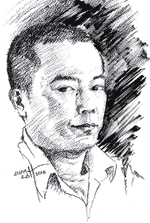
| By YENI | Tuesday, November 30, 2010 |
Yesterday, for the first time since her release from house arrest on Nov. 13, Burmese democracy leader Aung San Suu Kyi, accompanied by her son, Kim Aris, met with relatives of some of Burma's 2,200 political prisoners.
The meeting, which took place at the Pannitayama Monastery in Rangoon's Bahan Township, brought the country's most famous prisoner of conscience and a member of her family together with 70 others who represent just a tiny handful of the untold thousands in Burma separated from their loved ones due to political repression.
 |
| Yeni is news editor of the Irrawaddy magazine. He can be reached at [email protected]. |
It was a bittersweet moment for many who were present. Some mothers said that seeing Suu Kyi reunited with her son after more than a decade apart made them long to see their imprisoned children. But they also said they felt encouraged by the sight of the two together and were comforted by the knowledge that they are part of a much larger family—the family of all those who suffer for having the courage of their convictions.
“I felt happy when I met with Daw Suu and her son. It was like meeting with my own family,” said the mother of Dee Nyein Lin, who is serving a 15-year, six-month sentence in Hkamti Prison, Sagaing Division, for taking part in anti-government demonstrations.
For Suu Kyi, too, this encounter must have brought back memories of the price she has paid for her role in leading Burma's pro-democracy movement. Although she has always denied that she has made any extraordinary sacrifices, insisting that she has merely followed her own chosen path, there can be no doubt that she and her family have suffered greatly for the sake of restoring human rights and democracy in Burma.
Ever since she returned to Burma in 1988 to care for her dying mother, Suu Kyi's fate has been tied to the democratic aspirations of her country's people. As the daughter of Burma's national hero, Gen Aung San, Suu Kyi decided that she could not turn her back on the country after millions took to the streets to demand an end to military rule. As a result of this decision, she has spent 15 of the past 21 years in detention, and last saw her husband, Michael Aris, in 1995.
Aris died of prostate cancer in 1999 at the age of 53, after having been denied visas to see his wife for the three years leading up to his death. While her family supported her, Suu Kyi said in a recent interview that her sons had suffered particularly badly.
“They haven’t done very well after the breakup of the family, especially after their father died, because Michael was a very good father,” she said. “Once he was no longer there, things were not as easy as they might have been.”
Kim Aris, who is also known by his Burmese name, Htein Lin, is married and has two young children. He works as a carpenter in Britain, while his older brother, Alexander, or Myint San Aung in Burmese, is an academic in the US. Suu Kyi has never met her two grandchildren.
Even more than the sight of the thousands of jubilant supporters who had gathered outside her home to witness the moment of her release, Suu Kyi's reunion with her son must have been deeply moving for her.
Now that she has been freed, Suu Kyi has declared that winning the freedom of Burma's other political prisoners is one of her most important goals. It's not clear how she will achieve this, given the ruling regime's record of ignoring her calls for talks, but she has said that it is an issue on which she will not compromise.
“I don't think actually if we get to the negotiating table, the military will say we don't believe in the release of political prisoners. I don't think it works like that. That's one of my top priorities,” she told CNN in a recent interview.
For now, however, the dream of Burma's political prisoners reuniting with their families remains a distant one. For those still behind bars, all that lies ahead for the foreseeable future is more hardship, and for their families, the fear of their loved ones succumbing to the torture, harassment, depression and lack of health care that have claimed more than a few lives over the past two decades.
It is also important to remember that political prisoners are not alone in being cut off from their families. Tens of thousands of Burmese exiles around the world have also been forcibly separated from their families by the repressive policies of Burma's military regime. Like so many others, I have not seen my family—my parents and younger sister—since the army seized power in 1988.
If a nation can be compared to a family, Burma is a deeply dysfunctional one. We are estranged from each other and reduced to misery because some members of our family seek only their own advantage and are indifferent to our common interests.
But eventually, if we are not to fall even farther behind our neighbors and the rest of the world, we will have to take steps to achieve some sort of reconciliation. As a first step toward this grand “family reunion,” the country's rulers should start reuniting the country's political prisoners with their families and allowing Burma to become whole again, one family at a time.